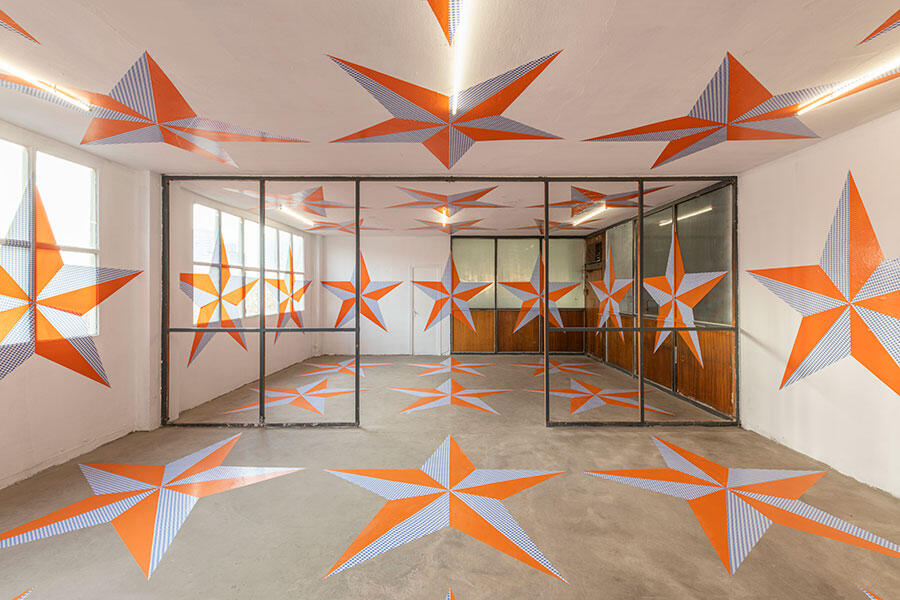Bruno Zhu Goes Back to the Future
At Cordova, Barcelona, the artist's backwards-running wristwatch evokes a well-worn sci-fi conceit to explore desire, consumerism and remembrance
At Cordova, Barcelona, the artist's backwards-running wristwatch evokes a well-worn sci-fi conceit to explore desire, consumerism and remembrance

An outsized satin wristwatch hangs in Cordova’s small office. Large blue gingham and orange vinyl stars span the walls, windows, doors, floor and ceiling of the adjacent gallery. Bruno Zhu’s exhibition, ‘I am not afraid’, can be consumed quickly and, as its title assures, apprehended without alarm. Yet, the digestion of its curiouser-and-curiouser blend of scalable and temporal enigmas, and autobiography with fiction, appropriately transpires more gradually.
Zhu does not regard the star stickers as works of art and, accordingly, he does not afford them a title. Yet, their application derives from a series of similar five-pointed, two-tone blazons created last year for ‘Chuva de Estrelas’ (Starburst), an exhibition realized as part of a programme that the artist runs at A Maior, his parents’ homewares store in Viseu, where four stars, each representing an employee, were applied to the floor in various departments.

Transposed to Cordova, this territory-marking effect transforms into a kind of bedazzled camouflage masquerading as exhibition display and is a counterpoint to the textile timepiece artwork, which is conversely in a location never intended for presenting art. Titled Are you ok? (2022), as if Zhu is concerned about our mental wellbeing, the wristwatch runs in reverse. The motif of backwards-running clocks is a well-worn sci-fi device, from Edward Page Mitchell’s tale ‘The Clock that Went Backward’ (1881) to the film The Curious Case of Benjamin Button (2008), and like all great time-machine conceits it threatens to open up philosophical conundrums about changing the past, while also encouraging cartoonish exaggeration. Tailored in a midnight blue that recalls a fairy-tale ballgown, the watch is both exquisitely camp and perversely soignée.

‘Look forward and reason backwards’ states one of the tenets of strategic game theory and, while a soft watch in Catalonia might easily hark back to Salvador Dalí’s melting clocks, Zhu’s intent is more intuitive than calculated and more sentimental than surrealist. He tells me at the exhibition opening that the work emulates a Patek Philippe device owned by his mother – or, at least, the stock-character version of his mother that features in his art practice – who has recently started collecting watches and has been drawn to the Swiss maker, whose cachet is somewhat incongruously based on the timelessness of its designs. That the analogue wristwatch is a dated technology, its function for telling the time long ago sublimated into luxury signalling and prestige fetish, makes it especially apt as a vehicle for Zhu’s evident interest in the amorphous function of desire, consumerism and remembrance.
‘I’ve grown bored of seeing images and subjects being stabilized in artistic production and, by that, I mean how categorical things have become in an era of supposed fluidity,’ Zhu disclosed in an interview accompanying his exhibition at UKS, Oslo, in 2020. Accordingly, he has sometimes designated works as having been made with intention but not as art, as well as imagining artworks, such as the watch, which, as he explains, could have plausibly been made by an earlier, or perhaps older, version of himself, or that would be better suited to another time.

‘The Clock that Went Backward’ was not only the first instance in fiction of a timepiece producing time travel, but the first proper exploration of the temporal paradox: how changing the past might affect the present. A speculative exercise in early-career late work, or retrospective juvenilia, ‘I am not afraid’ similarly and ingeniously imagines something like an art fiction sub-genre of science fiction, or vice versa. Whose wrist does this delicately grandiose watch fit? If time is going backwards, are we getting younger by beholding it? Would Zhu’s sophisticated and ambitious exhibition have been bursting with even more mischievous ideas had this review never been published?
Bruno Zhu's ‘I am not afraid’ is on view at Cordova, Barcelona, until 28 May 2022.
Main image: Bruno Zhu, ‘I am not afraid’, 2022, exhibition view, Cordova, Barcelona. Courtesy: the artist and Cordova, Barcelona; photograph: Roberto Ruiz
























